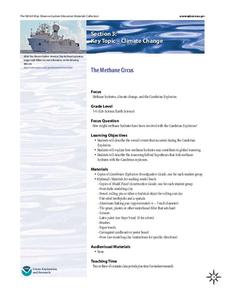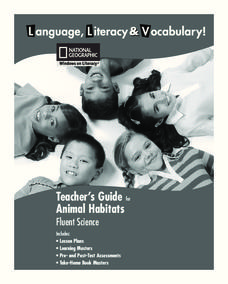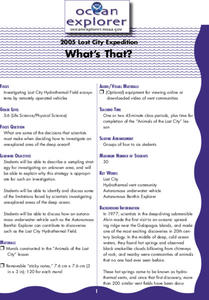NOAA
Animals of the Fire Ice
When the sun's rays can't reach the producers in a food web, where does all the energy come from? Extreme environments call for extreme food sources. Young scientists investigate creatures that appear to get their energy from methane...
Consortium for Ocean Science Exploration and Engagement (COSEE)
Arctic Smorgasbord
Though the walrus spends roughly one third of its time on land, it eats organisms that live on the bottom of the ocean. The first in a series of five, the lesson uses a variety of plant and animal cards to have scholars build an arctic...
Curated OER
Sponge-Painted Ocean Mural
I love big mural projects. They bring a sense of ownership to the classroom, look great for parents, and can be a great way to complete a unit. Here are the steps and suggestions needed to create an ocean mural for your class. Learners...
Ocean and Coastal Interdisciplinary Science
The Dark Ocean
Is the ocean blue at all depths? Nope! Explore the science behind the light spectrum in deep, dark waters. The lesson recommends watching The Blue Planet: Open Ocean—The Deep, but it's not integral, or you can substitute another clip....
Sea World
Ocean Discovery
Immerse your young marine biologists in the world of marine animals. The lesson includes several activities that are age-appropriate for preschoolers and kindergartners, including coloring pages, gluing feathers and sand onto paper...
Curated OER
The Chesapeake Bay in Captain John Smith's Time
When Captain John Smith visited the Chesapeake Bay in the summer of 1608, what types of animals and habitats did he encounter? Your young historians will analyze primary source documents to answer this question, as well as compare the...
NOAA
The Methane Circus
Step right up! An engaging research-centered lesson, the third in a series of six, has young archaeologists study the amazing animals of the Cambrian explosion. Working in groups, they profile a breathtaking and odd creature and learn...
National Geographic
Animal Habitats
Explore animal habitats and reinforce speaking, listening, reading comprehension, and writing skills with a unit that focuses on the Arctic, desert, ocean, prairie, and rainforest. Enthusiastic scientists read informational text to...
Curated OER
I, Robot, Can Do That!
Assign groups of middle school oceanographers to research one of the following underwater robots; ABE, Herculues, ROPOS, RCV-150, Tiburon, or general purpose ROVs. An included handout guides them through information to be gathered. Each...
Polar Trec
Nature's Density Column
Nature provides density columns in the polar regions that provides food for many animals. Young scientists build their own density columns with water in order to answer analysis questions. Through a slideshow presentation, scholars...
NOAA
An Ocean of Energy
Young biologists trace the path of the sun's energy through marine ecosystems in the second part of this four-lesson plan series. Building on prior knowledge about producers, consumers, and decomposers students are introduced to the...
NOAA
Deep-Sea Ecosystems – Life is Weird!
A pool of brine in the deep sea can be up to four times as salty as the surrounding sea water. The deep sea ecosystem relies on chemosynthesis and the organisms that live there are often strange to us. The lesson focuses on researching...
Curated OER
Who Would Win? Killer Whale vs. Great White Shark Storia Teaching Guide
Teacher guides are wonderful tools with tons of ideas that help you relate content in many different ways. Using the high-interest book, Who Would Win? Killer Whale vs. Great White Shark, learners hone their discussion and reading...
KOG Ranger Program
The Value of Oregon’s Forests
No matter where you go, you're in the middle of a forest in some way. Use a lesson about forests and the many ways they contribute to our world, including the ecosystems of animals and plants living in their shady soil.
Teach Engineering
Machines and Tools (Part 2)
Which pulley system will give us a whale of a good time? Teams compare the theoretical and actual mechanical advantages of different pulley systems. They then form a recommendation for how to move a whale from an aquarium back to the ocean.
Curated OER
Classifying Deep-Sea Organisms
Young scientists access the EARTH Web site in order to engage in this lesson life forms found in the ocean. Student groups of 3 - 4 choose one set of deep-sea organism images. The groups decide how they would classify their organisms and...
Ocean Explorer
Architects of the Coral Reef
Coral Reefs are the focus of a life science lesson plan. Upper graders look at how coral reefs are formed, how the animals and plants reproduce, and the variety of ways that humans benefit from coral reefs around the world. Groups of...
University of California
Energy and Biomass Pyramids
Young scientists play tag as they act out the food pyramid in the ocean ecosystem. Energy circles pass from the smaller prey to the predators and at the end of the activity, a data chart and analysis questions allow pupils to apply their...
Curated OER
What's That?
Meant to be a simulation of a deep-sea exploration, this requires that another lesson be completed first. In that lesson, titled "Animals of the Lost City," marine biology buffs construct murals of benthic communities. In this lesson,...
Curated OER
Massif Mystery
After reviewing plate tectonic theories and the discovery of both the Atlantis Massif and the Lost City hydrothermal vents, earth science learners complete a worksheet and participate in discussions about what the types of rock found...
NOAA
Journey to the Unknown
What's it like to be a deep-sea explorer? Tap into the imaginations of your fifth and sixth graders with a vivid lesson, the second part of a six-part adventure. Learners close their eyes and submerge themselves in an expedition aboard...
Polar Trec
Why Can’t I Eat This Fish?
Can turning on the television lead to toxins in the food supply? The lesson offers an opportunity for young scientists to complete guided research. A worksheet lists each question as well as the web page necessary to answer the question....
Wilderness Classroom
Pollution
Educate scholars on pollution—air, water, and land—with a series of lessons that begin with a thorough explanation of each type. Learners then take part in three activities to reinforce the importance of reducing pollution. They...
Science Matters
That’s An Otter Story
Young scientists discover how sea otters' habitats have changed due to human impact. Through conversation, video observation, and story reading, scholars identify how human interactions change a specific ecosystem in both positive and...
Other popular searches
- Ocean Ecosystems Animals
- Oceanic Trenches and Animals
- Grassland Animals Ocean
- Ocean Plants and Animals
- Oceans Animals
- Oceanic Animals Adaptations

























